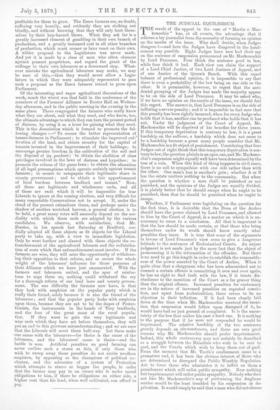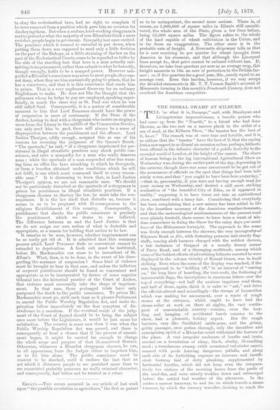THE JUDICIAL EQUILIBRIUM.
THE result of the appeal in the case of " Martin v. Mac- konochie " has, at all events, the advantage that it relieves a lay journalist from the necessity of forming an opinion on the merits of the issue. Who shall decide, when Judges disagree ?—and here the Judges have disagreed in the hand- somest way possible. Eight Judges have now had their say on the sentence of suspension pronounced on Mr. Mackonochie by Lord Penzance. Four think the sentence good in law, while four think it bad. Each view can claim the support of a Lord Chief Justice, of two Lord Justices of Appeal, and of one Justice of the Queen's Bench. With this equal balance of professional opinion, it is impossible to say that there is even a probability of the law being on one side or the other. It is permissible, however, to regret that the acci- dental grouping of the Judges has made the majority appear to be on the side of Lord Penzance. It may be asked why, if we have no opinion on the merits of the issue, we should feel this regret. The answer is, that Lord Penzance is on the side of inflicting a severe penalty; and it is impossible to feel sure that this penalty has been rightly incurred, when for every Judge who holds that it has, another can be produced who holds that it has not. Under the judgment of the Court of Appeal, Mr. Mackonochie will be deprived of his benefice for three years. If this temporary deprivation is contrary to law, it is a great hardship on the sufferer, a hardship which does not cease to be a hardship because a great many people consider that Mr. Mackonochie is a fit object of punishment. Considering that four Judges out of eight think that this temporary deprivation is con- trary to law, the question plainly is an open one, and Mr. Mackono- chie's suspension might equally well have been determined by the toss of a coin. When this kind of thing happens in civil cases, there is no call to sympathise with one side rather than with the other. One man's loss is another's gain ; whether A or B has the estate matters nothing to the community. But when the question is whether a man shall be punished or not punished, and the opinions of the Judges are equally divided, it is plainly better that he should escape when he ought to be punished, than that he should be punished when he ought to escape.
Whether, if Parliament were legislating on the question for the first time, it is desirable that the Dean of the Arches should have the power claimed by Lord Penzance, and allowed to him by the Court of Appeal, is a matter on which it is un- necessary to come to a conclusion. All that is important is that the law should be made certain, so that those who bring themselves under its wrath should know exactly what penalties they incur. It is true that some of the arguments in favour of Lord Penzance's view seem to give a dangerous latitude to the sentences of Ecclesiastical Courts. An unjust judgment is not made just by the mere fact that the object of pronouncing it is the reformation of the offender. But there is no need to go this length in order to establish the reasonable- ness of the power asserted by the Court of Arches. When it quite clear that a clergyman who has been admonished not to commit a certain offence is committing it over and over again, he has no right to find fault with the law, if it treats dis- obedience to the monition of the Court as a far graver thing than the original offence. Increased penalties for contumacy are in the nature of increased penalties on repeated convic- tion, and apart from aechnicalities, there seems to be no objection to their infliction. If it had been clearly laid down at the time when Mr. Mackonochie received the moni- tion that suspension would follow upon disregard of it, he would have had no just ground of complaint. It is the uncer- tainty of the law that makes his case a hard one. It is nothing to the purpose that if he were not suspended he would be imprisoned. The relative hardship of the two sentences greatly depends on circumstances, and there are very good reasons why Mr. Mackonochie should prefer imprisonment. Indeed, this whole controversy may not unfairly be described as a struggle between the Ritualists who wish to be sent to gaol, and the Courts which wish to keep them out of gaol. From the moment that Mr. Tooth's confinement came to a premature end, it has been the obvious interest of those who are determined to disregard the Public Worship Regulation Act to force those who administer it to inflict on them a punishment which will enlist public sympathy. Now nothing but imprisonment will enlist public sympathy. Nobody who does not like Mr. Mackonochie's way of performing the Anglican service would be the least troubled by his suspension or de- privation. It would simply be said that a man who did not choose to obey the ecclesiastical, laws, had no right to complain if he were removed from a position which gave him an occasion for disobeying them. But when a zealous, hard-working clergyman is sent to prison for what the majority of non-Ritualists think a mere crotchet, people begin to get uneasy. Sympathy hint once excited. The practices which it seemed so essential to put down, when putting them down was supposed to need only a little decision on the part of the Bishops, or a little straining of the law on the part of the Ecclesiastical Courts, come to be regarded as trifles by the side of the startling fact that here is a man actually sub- mitting to imprisonment, rather than submit to what he honestly, though wrongly, holds to be a usurped power. However mis- guided a Ritualist's conscience may seem to most people, they can- not deny, when they see him contentedly going to prison, that he has a conscience, and that it is this conscience that sends him to prison. That is a very unpleasant discovery for an ordinary Englishman to make. He does not like the thought that the policemen whom he helps to pay are employed, speaking super- ficially, in much the same way as St. Paul was when he was still called Saul. Consequently, it is a matter of considerable moment to him that Lord Penzance should have the power of suspension in cases of contumacy. If the Dean of the Arches, having to deal with a clergyman who insists on singing a verse from the Litany in the middle of the Communion Service, can only send 'him to gaol, there will always be a sense of disproportion between the punishment and the offence. Lord Justice Thesiger, oddly enough, assigned this as one of his reasons for reversing the judgment of the Queen's Bench. " The spectacle," he said, " of a clergyman imprisoned for per- sistence in illegal ritualistic practices may shock public con- science, and raise a sympathy for a man who really deserves none ; while the spectacle of a man suspended after due warn- ing from an office the laws attaching to which he disregards, or from a benefice obtained under conditions which he will not fulfil, is one which must commend itself to every reason- able man." It is distressing to learn that, in Lord Justice Thesiger's opinion, we are not reasonable men. We should not be particularly disturbed at the spectacle of a clergyman in prison for persistence in illegal ritualistic practices. If a clergyman chooses to disobey the law, lie must take the con- sequences. It is the law itself that disturbs us, because it seems to us to be pregnant with ill-consequences to the religious Establishment of this country. Consequently, a punishment that shocks the public conscience is precisely the punishment which we desire to see inflicted. The difference between us and the Lord Justice is that we do not assign our own notion of what is desirable and appropriate, as a reason for holding that notion to be law. It remains to be seen, however, whether imprisonment can be so easily got rid of. It is admitted that this summary process which Lord Penzance finds so convenient cannot be extended to deprivation. A fresh suit must be instituted, before Mr. Mackonoobie can cease to be incumbent of St. Alban's. What, then, is to be done, in the event of his disre- garding the sentence of suspension ? Some kind of violence must be brought to bear in that case, and unless the infliction of corporal punishment should be found so convenient and appropriate as to be incorporated by decree of some superior tribunal into the historical practice of the Court of Arches, that violence must necessarily take the shape of imprison- ment. In that case, these prolonged trials have only postponed the shock to the public conscience. To prison Mr. Mackonoohie must go, until such time as it pleases Parliament to amend the Public Worship Regulation Act, and make de- privation follow immediately on the first symptom of dis- obedience to a monition. If the eventual result of the judg- ment of the Court of Appeal should be to bring the subject once more before the Legislature, it would be just cause for satisfaction. The country is saner now than it was when the Public Worship Regulation Act was passed, and there is consequently at least a chance that if the process of amend- ment began, it might be carried far enough to change the whole scope and purpose of that ill-conceived Statute. Otherwise, whenever a Ritualist clergyman chooses, he can, to all appearance, force the Judges either to imprison him, or to let him alone. The public conscience must be content to be shocked, until it realises the fact that an act which it distresses people to see punished more than to see committed probably possesses no really criminal character, and consequently, had better not be treated as a crime.
Eunivra.—T ere errors occurred in our article of last week upon " the possible revolution in agriculture," the first so patent as to be unimportant, the second more serious. There is, of course, no 1,000,000 of square miles in Illinois still unculti- vated, the whole area of the State, given a few linos before, being 55,000 square miles. The figure refers to the whole of the land capable of wheat cultivation in the Union, and is far from an exaggeration. The other error is in the probable rate of freight. A Newcastle shipowner tells us that he is now receiving 5s. per quarter for wheat brought from America in his steamers, and that although the Liverpool lines accept 4s., that price cannot be reduced without loss. If, therefore, we take four quarters per aore as an average crop, this freight amounts to lfis. an acre of protection to the British far- mer ; or, if five quarters for a good year, 20s., nearly equal to an average rent. Even this burden, however, if we may accept the detailed statements in Mr. T. T. Vernon Smith's account of Minnesota farming in this month's Nineteenth,Century, does not overload the American competitor.



































 Previous page
Previous page